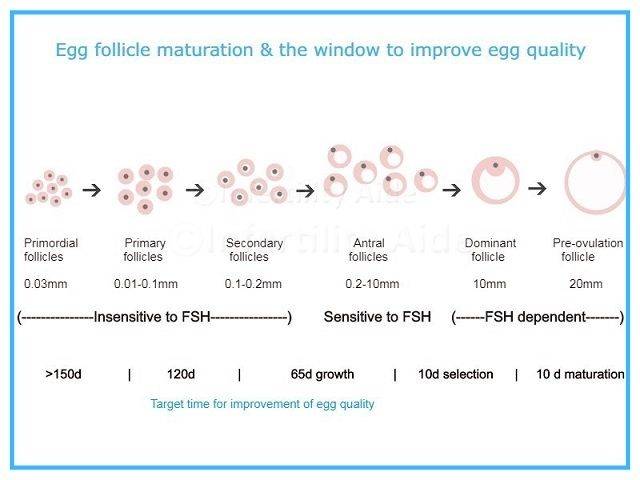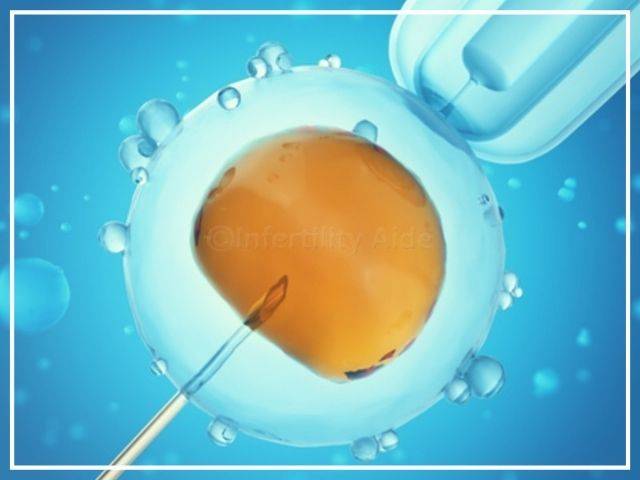Women trying to conceive naturally or with the help of IVF are always asking how to improve egg quality for IVF or natural pregnancy.
The quality of your eggs is one of the most important factors for a successful pregnancy and it can be enhanced with the right protocol.
Unlike men, whose sperm is produced every three months, the total eggs women have at birth (1-2 million eggs) are all their ovaries will ever produce. Only 300-500 of these will mature and be available for use through your lifetime.
As you age, the quality of eggs deteriorates and so does your ability to conceive.
“Besides causing conception problems, poor egg quality is also responsible for chromosomal problems in the embryo, which could result in the baby being born with certain medical problems,” says Dr. Leong, one of the top IVF doctors in Malaysia.
Can you improve egg quality in 30 days?
You’ve probably heard a ton of advice on all kinds of ways to improve your eggs but it is only useful if implemented at the right time.

The therapeutic interventions for improving egg quality must be applied while the egg is undergoing the maturation process and not when it has already matured and is ready for release.
It takes 12-13 months for the dormant follicles to prepare to release the egg and this maturation process hastens towards the final 120 days of the maturation process.
It is these final 3 months when a highly energy-intensive process takes place, stripping the egg to its final state with 23 chromosomes. And this is the time when all your efforts towards improving egg quality must be practiced.
While age plays a major role in the quality of eggs, it is not the only determining factor. The quality of developing eggs and their response to natural or external hormonal stimulation can also be affected by stress, environmental contaminants, poor diet, inflammation, drug abuse, excessive smoking, hormonal imbalance, etc.
How to check the quality of female eggs?
While there is no accurate method to determine the quality of eggs precisely before extracting them, there are some hormone indicators:
- FSH: When the ovaries do not respond to the normal signal of Follicle Stimulating Hormone (FSH), their quality is questionable. Higher the levels of FSH (on Day 2-3 of periods) in a woman can be an indicator of diminished reserve and poorer quality eggs.
- AMH: Another gauge for ovarian reserve is the Anti-müllerian Hormone (AMH), which drops as we age. Lower levels of AMH clearly indicate poor ovarian reserve, which often comes with poor quality of eggs.
However, it must be noted here that even women with poor ovarian reserve can conceive, if the few eggs they have are good quality.
Eventually, you just need one healthy, fertilized egg to be pregnant. Some of our clients were able to conceive even though there were only 2-3 eggs retrieved. It is not the number but the quality of eggs that matters for conception, so let’s look at some ways to improve egg quality and boost your fertility.

How to increase female egg quality?
- DHEA Supplements
Dehydro-epiandrosterone or DHEA is a mild, well-tolerated, male hormone that can have remarkable results for women with diminished ovarian reserve.
Very low levels of androgens in the ovaries may result in reduced ovarian reserve and poor-quality eggs, which can be turned around to a small extent with the supplementation of DHEA, as several trials have proven (1).
The supplements can be taken as an oral dosage of 75mg-100mg (strictly after consultation with your doctor), for a period of atleast 2 months before ovum pick-up is done. The actual effect is known to peak in 4-5 months.
Side effects, although rare, can be caused by the androgenous nature of DHEA. Some women may see acne, hair loss, abnormal growth of facial hair, etc. but even these tend to reverse as your hormones return to normal levels.
- CoQ10 supplements
CoQ10 (Coenzyme Q10) is an anti-oxidant that helps improve the quality of eggs. It acts like a nutrient for the mitochondria, which is the energy-house of human cells.
As you age, the number of healthy mitochondria and levels of CoQ10 decline. CoQ10 supplements can boost the energy in your egg cells.
A Chinese study (2) involving 169 women, found that the participants who were given CoQ10 supplements had higher number of eggs retrieved, better fertilization rates, better embryo quality, and hence, better chances of a successful pregnancy. - NAD +
Nicotinamide adenine dinucleotide (NAD) is a prominent metabolic cofactor that has been shown to reverse age-related decline in oocyte quality in female mammals (3).
“Our findings suggest there is an opportunity to restore egg quality and in turn female reproductive function using oral administration of NAD-boosting agents – which would be far less invasive than IVF. It is important to stress, however, that although promising, the potential benefits of these agents remains to be tested in clinical trials,” said Professor Hayden Homer of the University of Queensland in Australia.
- Glutathione
Another powerful anti-oxidant that fights free radicals and reduces the oxidative stress on your egg cells, resulting in healthier eggs and consequently, better embryos.
- L-arginine
By helping improve the blood supply to the uterus and ovaries, L-arginine helps create a better environment for egg production and fertilization.
- Myo-Inositol
PCOS often results in fertility problems as it causes the release of immature eggs, which cannot be fertilized well. Inositol supplements, especially when combined with Folic Acid, may improve your PCOS by reducing the level of triglycerides in the blood and improving ovarian function.
As the insulin function improves the symptoms of PCOS get better and it may further help by promoting ovulation.
Administration of inositol and folic acid in anovulatory women, taken daily for 3 months, was found to induce ovulation in 62% of the women in this study (4).
- Improve your nutrition
British researchers have found that female egg quality is affected by having too many refined carbohydrates, which break down quickly and cause a sudden spike in blood sugar.
So, avoid excessive breads, pasta, processed foods, and sugar-rich foods.
It is recommended that you have a balanced diet that comprises less than 40% carbohydrates, atleast 35% protein, and plenty of leafy greens, berries, and fruits that provide vitamins, minerals, and anti-oxidants.
- Avoid smoking, caffeine, alcohol
Nicotine is known to be toxic to your cells, including egg cells. Also, caffeine and alcohol, when consumed in excess can be harmful to your pregnancy.
- Exercise
Improving oxygen-rich blood flow to the ovaries can help improve the quality of eggs. Exercising and drinking more water is the simplest way to achieve that.
Obesity can compromise mitochondrial function and increase oxidative stress on your cells. Having a normal body mass index (BMI) helps improve your odds of conceiving successfully.
- Manage stress
While stress does not directly cause infertility, it can affect the quality of your eggs, causing them to function less. Prolonged stress also produces hormones such as cortisol and prolactin, which may interfere with normal ovulation.
- Acupuncture and Yoga
Acupuncture and yoga can both reduce anxiety and stress, improve blood flow to the ovaries and help your body get rid of toxins—all factors that may, over time, result in improved egg quality and ovarian function.
One of our own authors believes that acupuncture helps with infertility as it did for her.
How to improve egg quality after 40?
Mostly, women over the age of 40-41 years are directly asked to go for donor egg IVF because they are expected to have poor quality eggs, which could be because of premature luteinizing of follicles.
This means that the biological process inside the follicles goes faster in women over 40, which results in their eggs getting matured much sooner.
By using the standard protocol, it is possible that we’re using the eggs past their ideal time, which is the reason for poor quality.
Dr. Norbert Gleicher (5) suggests that by extracting the egg sooner in older women, it may be possible to use it at its optimal quality. They call this technique Highly individualized egg retrieval (HIER).
Early trials (6) have proven that by preponing the time of egg retrieval in women with poor ovarian reserve or premature ovarian failure, it may be possible to extract better quality eggs and improve the success rates of IVF. However, more research is required in this direction to be able to firmly establish these claims.
Meanwhile, you can definitely consider the different methods—DHEA, anti-oxidants, healthier lifestyle, etc.— to help improve your egg quality and enhance your chances of successful conception.
These ways of improving egg quality may have different results for different women, depending upon their individual factors. Consult with our qualified doctors to know more.
For expert advice on how to improve egg quality before IVF or how to make an egg strong for pregnancy, consult with our qualified doctors. Get in touch using the red contact button on this page.
References
- Naredi, N., Sandeep, K., Jamwal, V. D., Nagraj, N., & Rai, S. (2015). Dehydroepiandrosterone: A panacea for the ageing ovary?. Medical journal, Armed Forces India, 71(3), 274–277. https://doi.org/10.1016/j.mjafi.2014.12.022
- Xu, Y., Nisenblat, V., Lu, C., Li, R., Qiao, J., Zhen, X., & Wang, S. (2018). Pretreatment with coenzyme Q10 improves ovarian response and embryo quality in low-prognosis young women with decreased ovarian reserve: a randomized controlled trial. Reproductive biology and endocrinology : RB&E, 16(1), 29. https://doi.org/10.1186/s12958-018-0343-0
- Increasing NAD levels could improve quality of eggs, says research https://www.drugtargetreview.com/news/56052/increasing-nad-levels-could-improve-quality-of-eggs-says-research
- Kamenov, Z., Kolarov, G., Gateva, A., Carlomagno, G., & Genazzani, A. D. (2015). Ovulation induction with myo-inositol alone and in combination with clomiphene citrate in polycystic ovarian syndrome patients with insulin resistance. Gynecological endocrinology : the official journal of the International Society of Gynecological Endocrinology, 31(2), 131–135. https://doi.org/10.3109/09513590.2014.964640
- Dr. Norbert Gleicher of the Center for Human Reproduction: https://www.centerforhumanreprod.com/fertility/highly-individualized-egg-retrieval-hier/
- Wu, Y. G., Barad, D. H., Kushnir, V. A., Wang, Q., Zhang, L., Darmon, S. K., Albertini, D. F., & Gleicher, N. (2018). With low ovarian reserve, Highly Individualized Egg Retrieval (HIER) improves IVF results by avoiding premature luteinization. Journal of ovarian research, 11(1), 23. https://doi.org/10.1186/s13048-018-0398-8
Reviewed by: Dr. Meenakshi, PhD